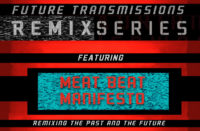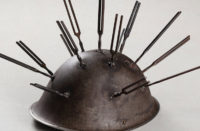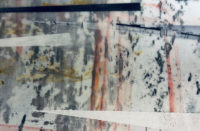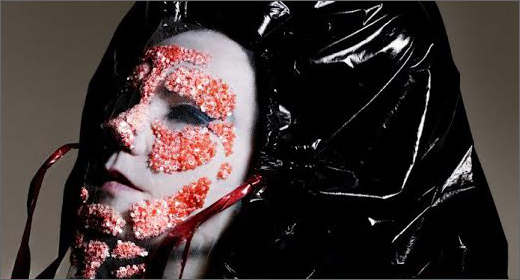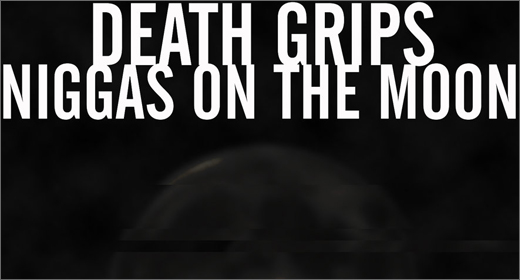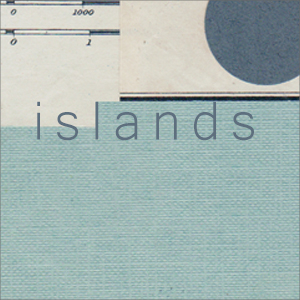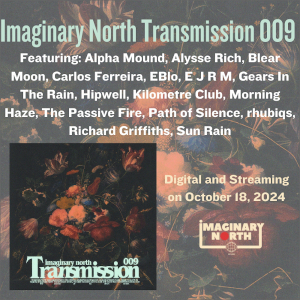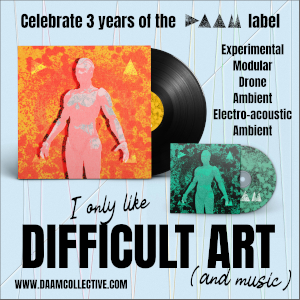While field recordings of Björk actually picking mushrooms or dancing on her coffee table is perhaps the biggest missed opportunity on Fossora, the opportunity of time that lockdown gave Björk to reconnect with nature, her evolving family and her love of the simple joys of domestic life, have delivered a truly remarkable album.

Deeply rooted in exploring the legacy and riches of both familial bonds and physical environment
Last time, on Star Trek: Björk— Leaving the decimated planet of Vulnicura, Lieutenant Commander Guðmundsdóttir takes off for the mythical planet of Utopia in search of alternative energy sources. Upon her arrival, she is greeted by a pack of Flute-wielding tribes-people who attempt to woo her into staying as their new leader and reconsider her complicated life back home.
And now the conclusion.
It’s been five years, and it would seem life on planet Utopia was actually going pretty well. Sure, there’s been political instability, family trauma and a pandemic—but what else is new? Otherwise though, our Commander has decided to return home. But she brings with her the knowledge and means to harvest the earth’s natural fungal mycelial energy via the use of clarinets and oboes and the rhythm of Gabber, helping to bring peace, prosperity and partying back when we need most of all. For her efforts, our officer is promoted to Fossora-in-chief, and they all live happily(ish) ever after.
For us mere civilians though, Fossora (a feminised twist on the Latin word for “digger“) is in fact an album deeply rooted in exploring the legacy and riches of both familial bonds and physical environment.
Global pandemics will certainly emphasize the importance of those, during which Björk dealt with the tragic aftermath of losing her mother to a lengthy illness. However, this was counterbalanced with the joys of becoming a grandmother herself, as her eldest son, Sindri, had his first child. Further to all this, Björk’s youngest daughter (Isadóra, aka Dóa) coming of age and leaving home understandably throwing another emotional curveball into the mix.

All that aside, Björk’s response to lockdown specifically was to host mini home-raves with her bubble of friends and family, discovering that the appropriate BPM for home raving was that of the Netherland’s most eye-brow raising 90s musical export; gabber. Relentless 4/4, abrasive, bass-heavy simple techno that would burn hard and burn-out harder. Perfect for making sure you’re partying to the max, but still in bed by 11pm. And so, enter Balinese duo, Gabber Modus Operandi, as one of the album’s most notable collaborators. Not just for their unique Indonesian twist on gabber and excitable, experimental low-fi techno, but for being only one of a very few core collaborators on the album to not be exclusively Icelandic and bringing a more global sound to proceedings.
Being held-up in a lakeside cabin while all the above was brewing makes for a logical explanation as to why Fossora‘s acoustic side has mostly led to her exploring earthy bass clarinets around choral and string arrangements, with just a touch of left-over flutes from 2017’s Utopia.
Opener and lead single “Atopos“ presents these elements like a jig-saw puzzle to the rest of the album. All the parts are there, but the clattering jumble of disconnected patterns, sharp edges and harsh angles have yet to be synched up, which mirrors perfectly with the sentiment of the lyrics of “hope is a muscle that allows us to connect.”
Second single and track, “Ovule,”is perhaps the album’s biggest curveball already. An ode to fertility and structure of love, the track itself employs densely layered vocals over a small, processed brass arrangement and textured, grinding mid-tempo beats. Both this and “Atopos“ purposely lay an obtusely in-direct red carpet into the album’s sonic theatre, opting to present you with Fossora‘s Periodic Table of elements upfront, but with no real immediate hint of how these will iron out into the surprisingly smooth main feature that follows.
Peppered with natty little experiments and conduit pieces ::
However, Fossora is still peppered with natty little experiments and conduit pieces. Track three,“Mycelia,” is an adorably joyful, deeply edited vocal experiment lifted from the same spiritual world of Björk’s 2004 acapella masterclass, Medúlla, mirrored by the sombre and minimal recital of traditional Icelandic folk poem Fagurt I Er Fjördum (“The Fjords Are Beautiful“), the choral eulogy to mother Hildúr, “Sorrowful Soil,” and the ultimate chaos of the interlude, “Trölla-Gabba” (absolutely not coincidentally, the word “Gabba” in Icelandic loosely translates to “Hoax” or “Fool”).
But further down the tracklist, these ingredients are embellished and woven into their own full symphonies and mini-epics, rooting Fossora surprisingly (but exquisitely) somewhere in between Medúlla and 2001’s domestic winter romance, Vespertine, in terms of tone and the world it inhabits.
Surprise third advance single, “Ancestress,” revives the time-honored trope of rich, epic string arrangements and sporadic electronics and bass, around dramatic, distant gongs and deeply insightful lyrics that chronicle Björk’s relationship with her mother and her unfortunate decline in health. As an epitaph at the very heart of the album, “Ancestress“is a deeply human and intimate tribute that manages to transcend grief and sorrow and opts for celebration instead, despite the often-literal narrative of her mother’s rather grim ailments and treatment. Sindri even lends his warm, distinctive voice to the chorus to offer his own tribute and gift the piece with a wonderfully authentic generational perspective to a much-revered mother, grandmother and great-grandmother.
It would not be hyperbolic to say that “Ancestress” is something of a surprise, subdued masterpiece, right up there with any of Björks other absolute classics. Considering the lyrics speak so frankly of her mother’s heart condition, it is even more remarkable that “Ancestress“ acts as Fossora’s literal heart which pumps blood to the rest of the album. It is what lets the toes of “Atopos“ wiggle in the soil, and the provides the saliva to lick the lips of the surprisingly flirty and crunchy “Fungal City” (with the assistance of Serpentwithfeet’s trademark soulful vocals neatly grinded into the mix).
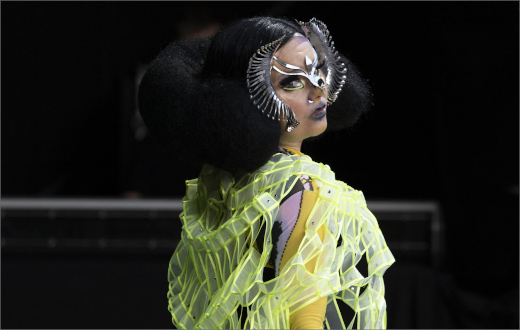
Another plot twist is the inclusion of “Allow“—a track initially revealed to be an early contender for 2017’s flute-lead, Arca co-production, Utopia, but was ultimately cast aside. Rather than reimagine the piece for clarinets, “Allow“ remains completely faithful to its flute ensemble origins, albeit no longer with Arca’s assistance. Its steady pace offers a welcome warm breeze through the soil and fungus, with the extra surprise inclusion of guest vocals by Norwegian singer/songwriter Emilie Nicholas.
While her appearance may have come out of nowhere with no apparent prior connection or common thread between the two to make this a logical collaboration, the results speak for themselves as Nicholas’ soft and sweet vocals smoothly lift “Allow“ to serene heights and compliment Björk’s familiar alien range unpredictably well.
Similarly serene is daughter Dóa’s presence on the album’s mediative closer, “Her Mother’s House”—the album’s final nod to the evolution of a family, and the ironic closeness generational divides can actually bring. Prayer-like and patient, the song layer’s Dóa distant voice into a blanket of choirs over delicate solo clarinets, as mother and daughter lament over the actually-charming pros and cons of empty nesting and popping back for weekends (“Thank you for having me – I’ll leave my shoes at the door. Something’s telling me that I’ve been here before”).
While Dóa could have quite easily also sang the Emilie Nicholas parts on “Allow” to similarly lovely effect, the logic behind the kin of Björk exclusively representing the generational themes on Fossora is something of a masterstroke for an artist who has spent her entire career shielding her family from the spot-light (and occasionally beating journalists up who dare cross that line). It only adds to a rare and genuinely relatable moment of human connectivity between Artist and Listener that Björk has often removed herself from throughout her more experimental work. Fossora‘s sincerity and unconscious generosity in offering this instantly dismisses any preemptive concern that Sindri and Dóa’s inclusion could have reduced such poignant themes to mere schmaltz, and really allows the album to be brought closer to your chest than any other Björk album in a very long time.
While this is all indeed utterly, peak-Vespertine levels of lovely, Fossora isn’t done exploring darker themes (and, yes—partying hard and being charmingly bonkers), just yet.
“Victimhood” is the yang to the “Ancestress” ying, as Björk delivers her final thoughts on Vulnicura’s divorce and the perspective all subsequent life events offer. Brooding, tense and calling back to the uneasy atmosphere of “An Echo A Stain“ (Vespertine‘s own signature moment of uneasy insecurity), “Victimhood” takes a simple, cliché 808-style drum beat and permits distant foghorns, bass swells, a fascinating tangle of bass clarinets and densely edited Medúlla-ish vocals to build to a dramatic climax.
Speaking of climaxes, the penultimate title track not only cheekily steals all focus, it also takes several other signature “Björk does pop” tropes (as perhaps best exhibited on 2011’s Crystalline from Biophilia, and even Utopia‘s own title track) and irons them out into the one of the most accomplished-yet-utterly-absurd pop bangers of her career.
Her most memorable melody in years is joyfully and aristocratically tooted out on the clarinets around an actual verse—albeit one-word—chorus structure, while the clatter of metallic gabber shards, cuts and debris quickly begins to gather around the joyful vocals. Midway through, the track breaks for a moment before unleashing the full gabber onslaught we were promised.

Pounding along at juggernaut pace and only gathering momentum, beneath the chaos are incredible left-turns, hypnotic bass lines and bewildering synths firing back and forth, as Björk purposely buries her voice deeper into the mix as her character literally breaks ground and digs deeper still (“At last we stayed in one space long enough, to shoot down deep hyphae roots, that penetrate concrete and plastic… Fossora!”)
We have waited exactly 25 years for another thrillingly nuts, pagan-techno opus to rival Homogenic‘s mighty “Pluto” (something neither Volta‘s protest rave-anthem “Declare Independence” or Biophilia‘s tectonic church-techno “Mutual Core” quite managed, despite their best efforts). But considering the first two minutes could easily be stripped back into something suitable for any formal acoustic woodwind recital, Fossora really is quite the achievement. If any Björk track deserves to be a crossover hit single, it’s this. An entire generation of retired 90s gabber ravers would finally have something genuinely brilliant to show for all the money wasted on drugs, glow-sticks and partying in the 90s.
If Björk is to be criticized for one thing in recent years though, it would perhaps be for her occasional habit of packing mixes too tight and over-baking the cake now and again (something the latter half Utopia especially suffered from in reflection). While Fossora‘s over-all production is no less air-tight, Björk and the stirling ear of mix/mastering engineer, Heba Kadry, seem to have finally found the equilibrium that allows the many elements of her songs to all shine, and balance an album of such possible intensity with actual breath, fun, and a sense that we’d all be welcome back to her cabin for an impromptu rave in her living room.
Let the album detour and focus on individual ingredients ::
By taking the time to let the album detour and focus on individual ingredients (notable shout-out to the opulent acoustic drama and exquisite pizzicato of “Freefall,” leading us conspicuously into the aforementioned brouhaha of the title track), the album happily bounces back and forth while never losing focus, steam or atmosphere.
Prior to the release of 2007’s Volta, much was made of Björk’s pending collaboration with Timbaland, which saw Volta hyped as her “return to pop.” The album might have had a few bops, but ultimately, two-minute interludes of ship sounds and hymns about suicide bombers and pneumonia is hardly what one might call “pop“. Fifteen years later, the “OMG, GABBER!?” here may only realistically be present on barely three songs. But, how the album delegates such wildly discordant ingredients over the 13 tracks and still manages to bring a collection of rather diverse songs together into such a cohesive whole is something we have not heard since 1995’s Post, thanks to the sheer joy and humor weaved throughout—the specific likes of which we haven’t perhaps heard since part of 1993’s Debut was recorded in the noisy toilet of a busy London club.
While field recordings of Björk actually picking mushrooms or dancing on her coffee table is perhaps the biggest missed opportunity on Fossora, the opportunity of time that lockdown gave Björk to reconnect with nature, her evolving family and her love of the simple joys of domestic life, have delivered a truly remarkable album. Not just for its balance of the baffling and beautiful, but for truly succeeding in helping us all to reconnect on the most human of levels.
Fossora is available on One Little Independent. [Bandcamp | Release page]







